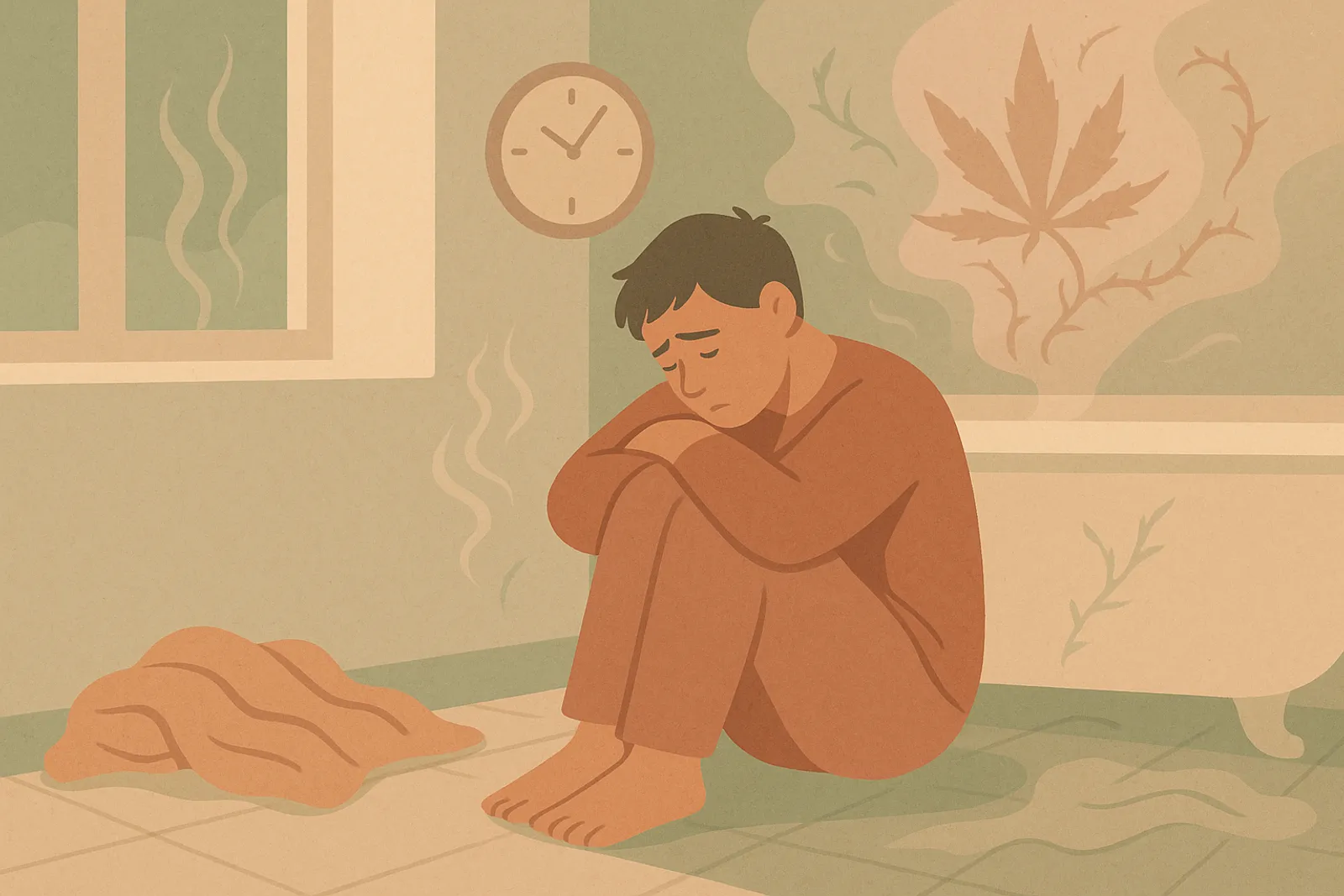When Cannabis Starts Feeling Different: Understanding CHS
Learn about Cannabinoid Hyperemesis Syndrome (CHS) - what it is, how to recognize it, and what to do if you're experiencing symptoms. A compassionate guide for cannabis users facing unexpected changes.

5 min read
Cannabis helps a lot of people. For stress, for sleep, for chronic pain—it’s part of many routines. But for some long-term users, something unexpected can happen.
It’s called Cannabinoid Hyperemesis Syndrome, or CHS.
What Is CHS?
CHS is a condition that causes recurring nausea, vomiting, and stomach discomfort in some people who’ve used cannabis over time. It often shows up years into regular use, which is part of why it can be so confusing.
One of the more unique signs is that hot showers seem to help, at least for a little while. That pattern has helped many people recognize what’s going on.
The Three Phases of CHS
Understanding CHS often means recognizing its progression through three distinct phases:
1. Prodromal Phase
- Morning nausea
- Abdominal discomfort
- Fear of vomiting
- Maintained appetite
- Symptoms may last months to years
2. Hyperemetic Phase
- Intense, persistent nausea and vomiting
- Abdominal pain
- Decreased food intake
- Weight loss
- Compulsive hot bathing or showering
3. Recovery Phase
- Gradual return to normal eating patterns
- Absence of nausea and vomiting
- Return to normal bathing habits
- Can take days to months
It Doesn’t Mean Cannabis Is Bad
CHS isn’t a judgment on cannabis or a reason to panic. It’s just something that can happen for certain people. Everyone’s body is different, and our relationship with cannabis can change over time.
CHS is still being studied. There’s a lot we don’t know, but it’s real and worth understanding.
Why Does This Happen?
While researchers are still studying the exact mechanisms, current theories suggest:
- Receptor Overstimulation: Long-term cannabis use may overstimulate cannabinoid receptors
- Individual Sensitivity: Some people may be more susceptible due to genetic factors
- Dose and Duration: Higher frequency and longer duration of use may increase risk
- Product Potency: Today’s cannabis products are often much stronger than in the past
If You’re Dealing With It
You might feel like no one believes you. Maybe you’ve been to the ER more than once. Maybe you’ve tried cutting out foods, changing routines, or just waiting it out.
If that sounds familiar, you’re not alone.
There’s a growing community of people talking about this. More doctors are learning to recognize it. And more resources are becoming available for people trying to make sense of what they’re experiencing.
Common Experiences
Many people with CHS report:
- Medical Confusion: Multiple ER visits before getting a diagnosis
- Disbelief from Others: Friends or family who don’t understand
- Isolation: Feeling alone in their experience
- Financial Stress: Medical bills from repeated hospital visits
- Lifestyle Disruption: Missing work, school, or social activities
What To Try
If you think CHS might be affecting you, here are a few things that can help:
Immediate Relief Strategies
- Hot Showers/Baths: Many find temporary relief in hot water
- Topical Heat: Heating pads or hot water bottles on the abdomen
- Stay Hydrated: Small, frequent sips of clear fluids
- Rest: Give your body time to recover
Documentation and Medical Care
- Keep a record of your symptoms and when they happen
- Notice how your body reacts during breaks or changes in your cannabis use
- Talk to a doctor you trust, and be prepared to explain CHS if they aren’t familiar
- Bring documentation of your symptoms and cannabis use history
Long-term Management
The most effective treatment for CHS is cannabis cessation. While this can be challenging, many people find:
- Gradual Reduction: Slowly decreasing use over time
- Complete Breaks: Taking extended periods away from cannabis
- Professional Support: Working with healthcare providers or counselors
- Alternative Therapies: Exploring other options for the conditions cannabis was treating
Finding Support
Online Communities
- CHS Support Groups: Connect with others who understand
- Medical Forums: Share experiences and learn from others
- Educational Resources: Stay informed about new research
Professional Help
- Primary Care Physicians: Your first stop for medical evaluation
- Gastroenterologists: Specialists in digestive system disorders
- Addiction Counselors: Support for cannabis cessation if needed
- Mental Health Professionals: Help managing anxiety or depression
Resources and Next Steps
If you’re looking for more information or support:
- Visit chs-awareness.com to learn more or find support
- Join our community forums to connect with others
- Consider sharing your story to help others
When to Seek Emergency Care
Seek immediate medical attention if you experience:
- Severe dehydration
- Inability to keep fluids down for 24+ hours
- Signs of electrolyte imbalance (dizziness, confusion, irregular heartbeat)
- Severe abdominal pain
- Blood in vomit
You’re Not Alone
CHS can be disruptive, but it doesn’t have to be isolating. The more we talk about it, the easier it gets for others to find answers.
Awareness doesn’t mean giving anything up. It just means being better informed—so you can make the right call for yourself, whatever that looks like.
Moving Forward
Remember:
- Your experience is valid - CHS is real and recognized by medical professionals
- Recovery is possible - Many people successfully manage or overcome CHS
- Support is available - You don’t have to figure this out alone
- Knowledge is power - Understanding CHS helps you make informed decisions
Whether you’re just learning about CHS, currently experiencing symptoms, or supporting someone who is, know that there’s a community here ready to help. Together, we can increase awareness, improve understanding, and support each other through this journey.
If you found this article helpful, consider sharing it with others who might benefit. The more we talk about CHS, the easier it becomes for people to find the answers and support they need.
Did you find this article helpful? Help us keep creating free CHS resources.
❤️ Support CHS Awareness